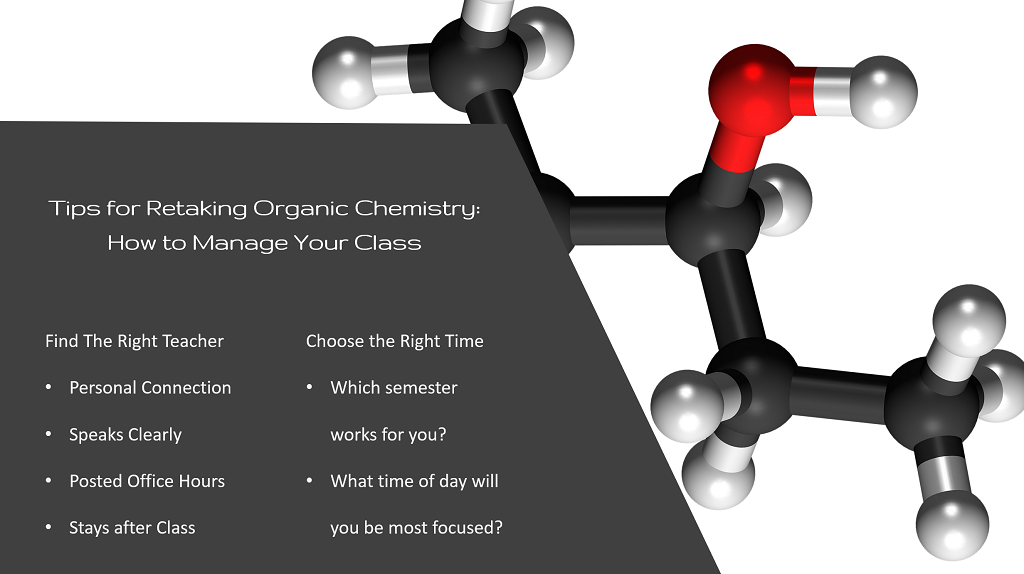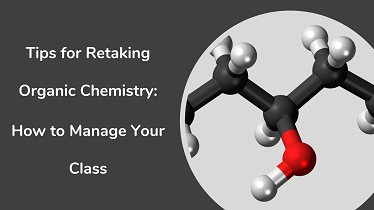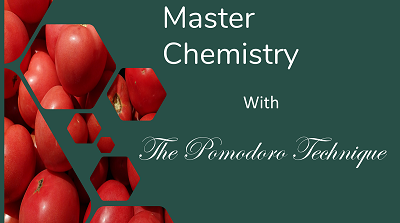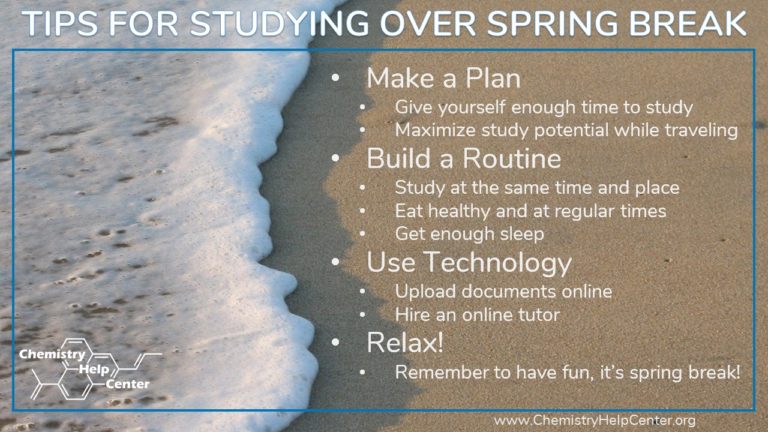Retaking Organic Chemistry: Part 1, Managing Your Circumstances

How To Manage Your Class If You Are Retaking Organic Chemistry
Organic chemistry has a reputation as being the most challenging science course. On average, 40% of students don’t pass on the first attempt. For most of those students, their final grade has very little to do with their ability to learn the material. Instead, many students are caught off guard by the unusual nature or the class. There are many traps students can fall into when signing up for and taking organic chemistry. If you are unprepared these traps can hurt your grade no matter how smart you are. Over the years of teaching and tutoring organic chemistry, I have helped dozens of students retake this class. In each case, what they needed more than someone to teach them the material was someone to help them develop a strategy to attack the course. This is the first of two posts that I am writing specifically to help returning organic chemistry students prepare for the class in a way that gives them the most opportunity to succeed. This post will be about managing everything external to the class to reduce the chance of being overwhelmed by the course load. The next post will be about study strategies to maximize your potential in and out of lecture.
Find the right teacher
Choosing which professor to take organic chemistry from is the most critical decision you can make going into the semester. Organic chemistry teachers act more like guides on a journey of discovery than taskmasters who force you to memorize an arbitrary set of information. You are going to rely on them to help you to “connect the dots” and help you to construct the true understanding on the subject. To succeed in the class, you want to develop a working relationship with your professor. If you end up with a professor who you have trouble working with, then you are in for a tough semester. A lot of how well you get along with your professor is going to be personal preference. Maybe you didn’t click with your last professor. If that is the case, make sure to transfer to a new class. But how can you make sure your next professor is any better?
While personal preference plays a significant role, there are some objective measures of what makes an excellent organic chemistry teacher. Importantly, they should speak clearly and have a projecting voice. Organic chemistry is taught in large lecture halls and chemists tend to be shy and soft-spoken by nature. Not being able to understand the teacher is more of an issue for students in this class than any of the others I have taught. If they mumble or don’t speak clearly, show up early so you can get a seat close to the front of the class.
Your teacher should also be approachable and invested in your success. It’s an unfortunate fact that there are a lot of professors who are just too burnt out or too arrogant to bother teaching sophomore organic chemistry well. It’s not always easy to spot these professors at first glance. They could seem friendly and knowledgeable on the first day of class but avoid you like the plague halfway through the semester when you need help the most. Look for professors who have clearly posted office hours, and who hang out after class to answer students’ questions. Both of those things are clear signals that they want you to do well and are willing to work with you. If you would like to know more, we have a whole blog on how to recognize a bad professor.
Choose the right time
The timing for your organic chemistry class can greatly affect your grade. As we will talk about in the next post, organic chemistry requires a lot of time and mental energy. How well you do in the class is profoundly influenced by how prepared you are to give the subject your undivided attention. If you have a chaotic schedule or are mentally preoccupied your chances of doing well in organic chemistry are much lower. When you are signing up to take organic chemistry, you should be thinking about two things: how you can consistently make time for the class during the semester in general, and how you can make time for it in your daily schedule.
Find the right semester
Students who are taking organic chemistry for the first time are much more likely to be locked into taking the class in a specific semester. Most schools have a schedule of when students are expected to take classes. Students who are re-enrolling in organic chemistry might have a lot more flexibility in deciding when the best time for them to take the class is. You might be able to fit organic chemistry into your schedule this upcoming semester. If so, great! Retaking organic chemistry the very next semester has the least amount of impact on your schedule and graduation date. However, there are lots of reasons why this might not be possible. If you are taking a high course load or other classes with lab components next semester adding organic chemistry to the mix will increase your stress level and decrease your potential grade. Students who need two semesters of organic chemistry might also have their graduation date pushed back a full year. At the very least, all students retaking organic chemistry should examine other options than just adding it to your course load in the next semester.
Summertime can be an excellent opportunity to catch up on your organic chemistry requirements. The class will be smaller, and you will get lots of personal attention from your teacher. There will also be less distractions, so you will have the opportunity to buckle down and focus on chemistry. For students worried about delaying other classes that have organic chemistry as a prerequisite, this is probably your best option. However, summer classes aren’t for everyone. If you are returning home for the semester, obviously this won’t work for you. The pace of the class can also be challenging. The highly condensed structure of the summer semester means that you could be in lecture 3-4 hours a day four times a week. After including study time, you will be treating organic chemistry as a full-time job. While some students enjoy the focus such an intense schedule gives, many find the grind to be exhausting. There will also be less institutional support, like recitation or free tutors, for summer students and you won’t have as many options for which teacher to choose.
For students who can wait a year, putting off retaking organic chemistry until next fall is another option. This will save you from summer classes and overly hectic spring semesters. In addition, many schools are set up to primarily teach the first semester of organic chemistry in the fall, and the second semester in the spring. If this is the case for your school taking organic chemistry in the fall will have several practical benefits. You will have the broadest range of teachers to choose from, and they will all be the “regular” organic chemistry teachers (sometimes professors who don’t typically teach organic chemistry are forced to teach it in the fall semester because the regular teachers are all teaching the second semester). You will also have access to recitation and university provided tutors. If you are taking the second semester of organic chemistry, you will get the same benefits for taking it in the spring. There are two main downsides to this option. The biggest being it is the most likely to push your expected graduation date back. Secondly, the class sizes are likely to be much larger which could lead to less personal experience. If you want some more details about the costs and benefits of taking chemistry classes in different semesters check out this blog here
Make the right schedule
After you have decided which semester to take organic chemistry in you should pay close attention to how you are blocking out your schedule for that semester. Most importantly, don’t plan on missing any days of school. This is not the semester to take a vacation I promise you. The class moves very quickly and even missing a single lecture can put you behind the 8-ball for the rest of the class. You should also think carefully about how you want organic chemistry to fit into the rest of your schedule.
When you are booking your classes, avoid taking organic chemistry early in the morning if it is at all possible. For most students just making it to an 8 am class on time is a challenge. For organic chemistry, you want to give yourself plenty of time to prepare before you get through the door. Right before lunch is another time students lose focus. If you schedule the class before you eat, then you might end up thinking more about food than chemistry. Try not to put two difficult classes back to back either. Your brain will be fried after the first one, and you will miss out on the second one.
There is one final piece of advice I want to give you when you are trying to block out your weekly schedule. Save a substantial chunk of time specifically for studying organic chemistry. Chemistry isn’t something you can do with the TV going in the background, or at your friend’s house. Organic chemistry requires dedicated and focused study time. Try to give yourself a few hours every day where you can go someplace quiet and comfortable and study chemistry without being interrupted. You are going to appreciate having access to that time later in the semester.
Conclusion
Retaking an organic chemistry class isn’t the end of the world, and it doesn’t mean that you are bad at chemistry. I know at least one student took the first semester of sophomore organic chemistry twice, then went on to get their Ph.D. in chemistry. Students taking organic chemistry the first time can walk into a lot of situations that make getting through the class much more difficult. However, students returning to organic chemistry have more opportunity to manage the circumstances around when and how they take the class. Hopefully, with this added knowledge and a little bit of preparation, you can go into chemistry on your own terms.
I’m going to be writing a follow-up post about how returning students can manage their time in lecture, and while studying. We will be posting that soon so come back shortly so you can read the second half of how to retake organic chemistry!







